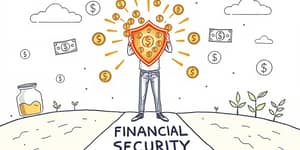In late 2025, Americans face a financial landscape shaped by economic uncertainty and inflation. A majority—57%—rate their finances as fair or poor, and pessimism is on the rise: 28% anticipate worsening conditions, up from 16% in 2024.
Despite these challenges, 90% of adults set financial goals for the year, signaling a collective resolve. Learning to adapt, build resilience, and develop practical strategies is key to regaining control and confidence.
The State of Personal Finances in 2025
Understanding the current financial climate lays the groundwork for action. Below is a snapshot of critical data points shaping Americans’ money management this year:
These figures reveal both the depth of concern and the areas ripe for strategic improvement. From emergency savings to spending habits, every data point tells a story of challenge and opportunity.
Barriers to Progress
Before moving forward, it’s crucial to identify the obstacles standing between you and financial security:
- Increased expenses that strain monthly budgets
- Decreased income due to job shifts or market fluctuations
- Cutting back on spending as a necessary survival tactic
- Delayed travel and postponed renovations impacting quality of life
- Carrying more debt than feels manageable
Recognizing these barriers allows you to tackle each with targeted strategies rather than feeling overwhelmed by the big picture.
Strategies for Reclaiming Control
Transforming obstacles into opportunities begins with clear, actionable steps. The journey comprises four pillars: budgeting, saving, debt management, and adapting to market changes.
Budgeting as a Recovery Tool
Creating a realistic budget is the cornerstone of financial recovery. It provides a roadmap—especially vital if you’re bouncing back from setbacks like job loss or health-related expenses.
- Track every expense without judgment to build awareness
- Include accountability partners, such as advisors or peer groups
- Use budgeting apps to automate categorization and alerts
- Allocate both essentials and small rewards to maintain morale
By sticking to a simple yet comprehensive plan, you prevent old habits from creeping back and build sustainable financial routines.
Building Sustainable Saving Habits
With budgets in place, channeling extra funds into an emergency cushion provides peace of mind. Even on a tight income, small, consistent deposits can add up.
High-yield savings accounts, now adopted by 11% of households, offer up to ten times the interest of standard accounts. Automating transfers—consider setting up weekly or bi-weekly moves—ensures you save before you can spend.
For individuals prone to impulse spending or navigating recovery, consider accounts with withdrawal limits or share your goals with a trusted advisor. These digital guardrails and behavioral triggers act as bulwarks against financial temptation.
Debt Management in a High-Interest Environment
Higher interest rates make debt especially burdensome. Millennials and Gen Z are turning to buy now, pay later services like Affirm or Afterpay to avoid credit card traps. While flexible, these plans require discipline.
Priority one: tackle variable-rate balances through snowball or avalanche methods. Snowball focuses on the smallest balances, building momentum; avalanche targets the highest rates, saving on interest costs.
Negotiate lower rates with credit issuers, apply windfalls to principal balances, and consult certified credit counselors. Each step brings you closer to freedom from the stress of mounting interest.
Navigating Market Changes and Opportunities
As the Federal Reserve signals rate cuts, evaluate whether to shift savings into short- or medium-term vehicles, such as Certificates of Deposit (CDs) that lock in competitive rates.
Refinancing existing high-interest loans can reduce monthly payments and free up cash. Investors should review portfolios to align with evolving goals and risk tolerance, seeking professional guidance if needed.
The Power of Support and Financial Literacy
Rebuilding financial health is rarely a solo endeavor. Community resources—from recovery groups to employer-sponsored counseling—offer both knowledge and moral support.
Online platforms and apps provide structured learning paths in budgeting, investing, and debt reduction. Peer networks on social media promote social financial accountability networks, sharing successes and cautionary tales to keep you motivated.
Looking Ahead with Confidence
Your financial journey is incremental not instantaneous progress toward goals. It’s shaped by the daily choices you make, from manual entry in a budgeting app to resisting impulse purchases.
Celebrating small milestones—paying off a credit card, reaching a new savings target—builds momentum. Each victory, no matter how small, reinforces positive habits and fosters optimism.
Stay informed about emerging trends like digital tools integrating artificial intelligence for personalized advice, and continue to adapt strategies as economic conditions evolve.
Start Your Path to Financial Independence Today
Take one small step: whether it’s downloading a budgeting app, setting up an automatic transfer to savings, or reaching out to a credit counselor. Action transforms anxiety into empowerment.
Reclaiming your financial future isn’t just about numbers; it’s about restoring agency and envisioning a life not dictated by financial stress. Embrace the journey, stay committed, and watch your efforts pave the way toward lasting security.
References
- https://www.nerdwallet.com/article/finance/2025-financial-goals-midyear-check-in-report
- https://www.truelinkfinancial.com/blog/how-to-build-budgeting-and-savings-habits-while-in-recovery
- https://meetglimpse.com/trends/personal-finance-trends/
- https://www.ikonrecoverycenters.org/how-financial-literacy-supports-long-term-recovery/
- https://www.pewresearch.org/short-reads/2025/05/07/growing-share-of-us-adults-say-their-personal-finances-will-be-worse-a-year-from-now/
- https://thestatement.bokf.com/articles/2024/12/get-your-finances-in-order-for-the-new-year
- https://www.westernsouthern.com/personal-finance/how-to-plan-your-finances










